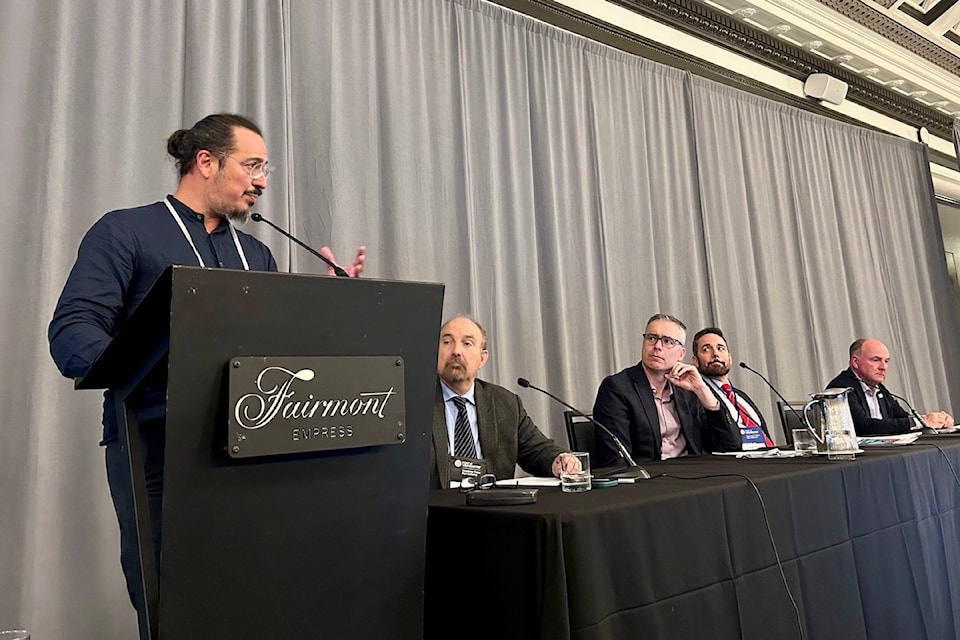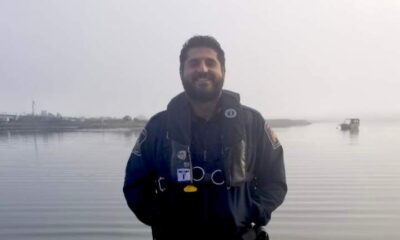Top Stories
B.C. Shelter CEO Calls for Involuntary Care Amid Crisis

UPDATE: The CEO of Our Place in Victoria, Julian Daly, has urgently called for a transformative approach to the ongoing addiction crisis during the Union of B.C. Municipalities (UBCM) convention, which began today, Sept. 22, 2023. He argues that British Columbia must recognize homelessness as a health issue, potentially requiring involuntary treatment for those unable to make informed decisions about their care.
Addressing a panel alongside prominent figures such as Adam Dalrymple from B.C.’s Crown Counsel Association and Dr. Daniel Vigo, a special advisor on psychiatry, Daly emphasized the dire need for urgent action. “Leaving them to die on the sidewalk with little but their liberties intact is not compassion. It is abandonment,” he stated, highlighting the pressing nature of the crisis.
The discussion comes as street disorder escalates in Victoria, particularly around the city’s most notorious homeless encampment. The annual UBCM convention is focusing heavily on this topic, with fourteen resolutions set for a vote, including a special resolution calling for increased provincial funding for supportive housing and shelter initiatives.
Dr. Vigo presented alarming insights into the crisis, attributing it to the closure of the Riverview psychiatric hospital, the rise of potent synthetic drugs, and inadequate concurrent care for mental health and addiction. He noted that the closure has led to a decrease in involuntary care, which was once a critical therapeutic tool.
“We know that the brain volume decreases in this population compared to control,”
Dr. Vigo remarked, underlining the cognitive decline among those affected by the crisis.
Throughout the convention, many local leaders, including mayors, concurred that addressing this epidemic may require some form of involuntary care. Daly reflected on the dramatic changes in drug use over the past 17 years, stating, “The landscape is almost unrecognizable. The drugs have changed, and they have changed everything.” He pointed to the emergence of fentanyl and carfentanil, drugs that are exponentially more potent than their predecessors.
Daly criticized the impacts of decriminalization, describing it as a well-intentioned policy that inadvertently “fed the problem.” He also referred to “catch-and-release” policing as a key factor that has exacerbated street-level issues, with individuals no longer facing consequences for minor offenses.
“What was once hidden is now everywhere,” Daly asserted, as he detailed how disturbing behaviors have become normalized, creating an environment of fear among both the housed and unhoused populations.
His recommendations for tackling this crisis include treating it primarily as a health crisis rather than solely a housing issue. He acknowledged that while housing efforts have been beneficial, many individuals experiencing persistent homelessness have been housed only to return to the streets.
“Enforcement for some, health care and housing for others,” Daly emphasized, calling for a collaborative approach involving police, health authorities, non-profits, and housing services to effectively address the crisis. “Compassion must be balanced with accountability,” he concluded.
The UBCM convention will continue until Sept. 26, with ongoing discussions expected to shape future strategies for addressing the escalating addiction crisis in British Columbia.
-

 Politics4 weeks ago
Politics4 weeks agoSecwepemc First Nation Seeks Aboriginal Title Over Kamloops Area
-

 World5 months ago
World5 months agoScientists Unearth Ancient Antarctic Ice to Unlock Climate Secrets
-

 Entertainment5 months ago
Entertainment5 months agoTrump and McCormick to Announce $70 Billion Energy Investments
-

 Science5 months ago
Science5 months agoFour Astronauts Return to Earth After International Space Station Mission
-

 Lifestyle5 months ago
Lifestyle5 months agoTransLink Launches Food Truck Program to Boost Revenue in Vancouver
-

 Technology3 months ago
Technology3 months agoApple Notes Enhances Functionality with Markdown Support in macOS 26
-

 Lifestyle3 months ago
Lifestyle3 months agoManitoba’s Burger Champion Shines Again Amid Dining Innovations
-

 Top Stories2 months ago
Top Stories2 months agoUrgent Update: Fatal Crash on Highway 99 Claims Life of Pitt Meadows Man
-

 Politics4 months ago
Politics4 months agoUkrainian Tennis Star Elina Svitolina Faces Death Threats Online
-

 Sports5 months ago
Sports5 months agoSearch Underway for Missing Hunter Amid Hokkaido Bear Emergency
-

 Politics5 months ago
Politics5 months agoCarney Engages First Nations Leaders at Development Law Summit
-

 Technology5 months ago
Technology5 months agoFrosthaven Launches Early Access on July 31, 2025





















